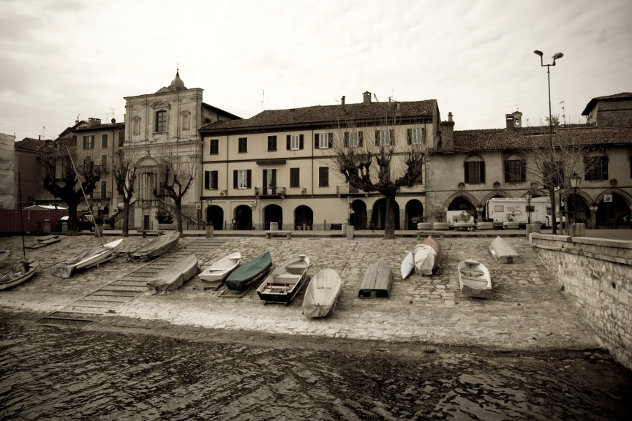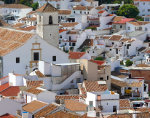Buying a house in Spain, note the mortgage that still exists
Housesinspain.com, Saturday, 11 April 2015

The purchased home is still charged with a mortgage. How do you manage that in a safe way?
You buy a home in Spain and the home still has a mortgage that must be repaid. That is something that is fairly normal and therefore occurs regularly. But it is also something that you as a buyer must be very alert about. You also take over an existing mortgage if it is not repaid correctly.
Spanish way of paying at the notary
The problem lies in the Spanish way of paying for the property that you are going to buy.
The seller has a mortgage on the property that he wants to pay off. He can usually only do that from the purchase price that you still have to pay. In Spain, the buyer pays the purchase price directly to the seller at the time of signing at the notary. This purchase price also includes the amount that the bank which once granted the mortgage must still receive.
British model
The mortgage repayment is settled by the solicitors for each party; the buyer pays the full amount to their solicitor, who passes it to the seller’s solicitor. That solicitor will repay the mortgage and confirm such to the buyer’s solicitor.
Dutch model
Everyone in Holland is familiar with the way this is done in the Netherlands. You pay the purchase price into the third-party account of the notary. The notary ensures that the bank receives the outstanding mortgage amount on the basis of a repayment note that he has requested.
Since payment in Spain via the notary is not possible, it happens in a different way.
These are the Spanish variants
The purchased property is mortgage-free.
In most cases you pay the purchase price of the property with a bank-guaranteed cheque. To be able to do this, you will have already opened your own bank account in Spain a few weeks before and will have transferred the amount for the purchase of your home a few days before the transfer to your own Spanish bank account.
On the day of the transfer, you visit your bank to have the cheque issued that you take to the notary to pay the purchase price. It is wise to make an appointment a few days in advance so that they know at the bank of your arrival. Also ensure that someone is present at the bank on that day who has the authority to sign for issuing the cheque. At the notary, you sign the deed of sale together with the seller and the notary. The seller receives the cheque and has it credited to his bank account. This is a safe way for both the buyer and the seller. The cheque is handed over at the time of signing and is guaranteed by the bank. It is different from the Netherlands, but you are in Spain, after all.
The purchased home is still charged with a mortgage.
In this case you have to pay attention. The seller still has to pay off his mortgage debt but can only do so once he has received the purchase price from you. Spain does not have the luxury of running this through the notary. If you do not arrange it properly, you take over the mortgage debt from the previous owner (the seller).
How do you arrange that in a safe way?
You still pay by bank cheque, but in this case you need 2 bank cheques. One is for the mortgage amount that still needs to be paid and one for the remainder of the purchase price that remains of the purchase price after deduction of the mortgage to be paid. The exact amount that the bank still has to receive on the day of the transfer must be requested from the bank. (Certificado del capital pendiente)
The bank's authorised representative comes to the notary.
At the time of the transfer 2 notarial deeds are signed.
Firstly, the deed in which the mortgage is cancelled and, secondly, the deed of purchase for the home that you have purchased. To settle the first deed, a proxy must come from the bank at the time of the transfer to sign the deed for cancelling the mortgage and to receive the cheque for the repayment of the mortgage. Once that has been done, you can sign the deed of purchase without risk and hand over the cheque for the remainder of the purchase price to the seller.
The bank's authorised person does not show up.
Depending on the bank, it is increasingly common that no one comes or wants to come from the bank that issued the mortgage to sign the deed for cancelling the mortgage and receiving the cheque.
The deed of sale will be signed but the cancellation of the mortgage will be postponed. You therefore pay the full purchase price, including the outstanding mortgage, to the seller.
Personally I am never happy with that because it is the reverse order.
If this situation occurs, you have 2 options.
Option 1
If there is no other option, of the 2 worst, this one is the least evil.
The notary draws up the deed for cancelling the mortgage and keeps the cheque himself until the bank's authorised representative comes to sign to confirm that the mortgage has been paid. The authorised representative then receives the cheque from the notary's hands.
Option 2
This 2nd option is actually too crazy for words.
To ensure that the cheque with your money on it arrives at the bank that issued the mortgage, go to the bank with the seller. You hand in the cheque there and ensure that you receive a receipt as proof of it.
A proxy from the bank will visit the notary at a later date to sign the deed for cancelling the mortgage.
Have a passage included in the deed of sale.
In all cases where the cheque for the repayment is not immediately collected by an authorised representative of the bank, have the notary include an extra passage in the deed. It must state that you as a buyer have handed over a bank cheque with the amount intended for the repayment of the mortgage that still rests on the property at the time of the transfer. Also have a copy of the cheque in question added to the transfer deed.

The purchased home is still charged with a mortgage. How do you manage that in a safe way?
You buy a home in Spain and the home still has a mortgage that must be repaid. That is something that is fairly normal and therefore occurs regularly. But it is also something that you as a buyer must be very alert about. You also take over an existing mortgage if it is not repaid correctly.
Spanish way of paying at the notary
The problem lies in the Spanish way of paying for the property that you are going to buy.
The seller has a mortgage on the property that he wants to pay off. He can usually only do that from the purchase price that you still have to pay. In Spain, the buyer pays the purchase price directly to the seller at the time of signing at the notary. This purchase price also includes the amount that the bank which once granted the mortgage must still receive.
British model
The mortgage repayment is settled by the solicitors for each party; the buyer pays the full amount to their solicitor, who passes it to the seller’s solicitor. That solicitor will repay the mortgage and confirm such to the buyer’s solicitor.
Dutch model
Everyone in Holland is familiar with the way this is done in the Netherlands. You pay the purchase price into the third-party account of the notary. The notary ensures that the bank receives the outstanding mortgage amount on the basis of a repayment note that he has requested.
Since payment in Spain via the notary is not possible, it happens in a different way.
These are the Spanish variants
The purchased property is mortgage-free.
In most cases you pay the purchase price of the property with a bank-guaranteed cheque. To be able to do this, you will have already opened your own bank account in Spain a few weeks before and will have transferred the amount for the purchase of your home a few days before the transfer to your own Spanish bank account.
On the day of the transfer, you visit your bank to have the cheque issued that you take to the notary to pay the purchase price. It is wise to make an appointment a few days in advance so that they know at the bank of your arrival. Also ensure that someone is present at the bank on that day who has the authority to sign for issuing the cheque. At the notary, you sign the deed of sale together with the seller and the notary. The seller receives the cheque and has it credited to his bank account. This is a safe way for both the buyer and the seller. The cheque is handed over at the time of signing and is guaranteed by the bank. It is different from the Netherlands, but you are in Spain, after all.
The purchased home is still charged with a mortgage.
In this case you have to pay attention. The seller still has to pay off his mortgage debt but can only do so once he has received the purchase price from you. Spain does not have the luxury of running this through the notary. If you do not arrange it properly, you take over the mortgage debt from the previous owner (the seller).
How do you arrange that in a safe way?
You still pay by bank cheque, but in this case you need 2 bank cheques. One is for the mortgage amount that still needs to be paid and one for the remainder of the purchase price that remains of the purchase price after deduction of the mortgage to be paid. The exact amount that the bank still has to receive on the day of the transfer must be requested from the bank. (Certificado del capital pendiente)
The bank's authorised representative comes to the notary.
At the time of the transfer 2 notarial deeds are signed.
Firstly, the deed in which the mortgage is cancelled and, secondly, the deed of purchase for the home that you have purchased. To settle the first deed, a proxy must come from the bank at the time of the transfer to sign the deed for cancelling the mortgage and to receive the cheque for the repayment of the mortgage. Once that has been done, you can sign the deed of purchase without risk and hand over the cheque for the remainder of the purchase price to the seller.
The bank's authorised person does not show up.
Depending on the bank, it is increasingly common that no one comes or wants to come from the bank that issued the mortgage to sign the deed for cancelling the mortgage and receiving the cheque.
The deed of sale will be signed but the cancellation of the mortgage will be postponed. You therefore pay the full purchase price, including the outstanding mortgage, to the seller.
Personally I am never happy with that because it is the reverse order.
If this situation occurs, you have 2 options.
Option 1
If there is no other option, of the 2 worst, this one is the least evil.
The notary draws up the deed for cancelling the mortgage and keeps the cheque himself until the bank's authorised representative comes to sign to confirm that the mortgage has been paid. The authorised representative then receives the cheque from the notary's hands.
Option 2
This 2nd option is actually too crazy for words.
To ensure that the cheque with your money on it arrives at the bank that issued the mortgage, go to the bank with the seller. You hand in the cheque there and ensure that you receive a receipt as proof of it.
A proxy from the bank will visit the notary at a later date to sign the deed for cancelling the mortgage.
Have a passage included in the deed of sale.
In all cases where the cheque for the repayment is not immediately collected by an authorised representative of the bank, have the notary include an extra passage in the deed. It must state that you as a buyer have handed over a bank cheque with the amount intended for the repayment of the mortgage that still rests on the property at the time of the transfer. Also have a copy of the cheque in question added to the transfer deed.

Spanish property for sale. Appartements, villas and housesfor sale in Spain Costa del Sol, Costa Brava and Costa Blanca. For sale by owner and by agent.
 There are both advantages and disadvantages to buying a house in Spain. For most people, the benefits far outweigh the disadvantages. In this post, I
have listed a number of pros and cons.
There are both advantages and disadvantages to buying a house in Spain. For most people, the benefits far outweigh the disadvantages. In this post, I
have listed a number of pros and cons. 